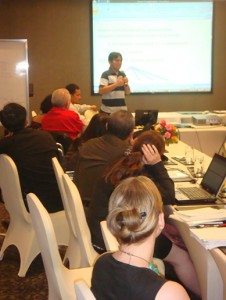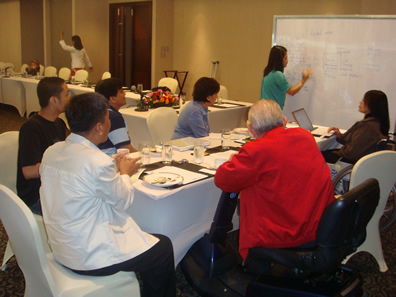MCCID Training Director Jojo Esposa Jr. together with Deaf Teacher Jerome Marzan participated in the one-day Workshop Consultation on Persons With Disabilities sponsored by the Australian Government through its Australian AID program last November 21 at Oakwood Premier Hotel in Ortigas, Pasig City.
The activity was one of the culminating workshops held since September 2008. The Australian Government aims to establish a situational analysis on how government and non-government institutions in the Philippines involved in disability issues are implementing activities to address inclusive development for programs that support Persons With Disabilities. They aim to establish a partnership program through their “Development for All” initiatives with focus on people with disabilities.
Key AusAID officials attended the affair coordinated by Ms. Bernadette Cariaga, Program Officer for Development Cooperation and Focal Person for Disability. With education for people with disabilities as its main agenda, the participants were divided into groups addressing the Philippine educational system. The groups were able to come up with situations and successful programs which answers the following questions:
- What is working well- examples of practice that are working particularly well in certain contexts?
- What are the factors present that are contributing to the successful examples given and
- What are the resources- knowledge, skills, experience, financial, that we have and can make use of?
- What need to be the future objectives in the short (3 years) to medium (5 years) term?
- What needs to be done and actions to achieve them- the steps that need to take place, the contributors to the action, the types of resources required?
MCCID College Team joined the Alternative Learning System of Education Situational Analysis for Persons With Disabilities with members led by National Council on Disability Affairs Executive Director Geraldine Ruiz (facilitator), Liliane Foundation Philippines National Correspondent Teresa Dela Cruz, Autism Society of the Philippines Executive Director Ranilo Sorongon, Nova Foundation President Noli Agcaoili and Akap Pinoy Representative Daylin Taleon. The group was able to come up with good practices which addresses employability, self-sustaining, improvement of life, enjoyment of life and productivity. Also present in the workshop is Philippine Federation of the Deaf President Raquel Estiller-Corpuz.

The group was able to coin a new term replacing the Alternative Learning System. They renamed it as “ALTERNATIVE TECHNICAL/PRACTICAL LEARNING OPPORTUNITIES (ATPLO)“. They agreed that no skill is too high that is unachievable for PWD. Focus on individualized learning abilities of PWDs. Extend reasonable accommodation to upgrade and enhance the qualifications of PWDS as part of advocacy based on UN-CRPD.
In strategizing for ATPLO, the group was able to come up with the following:
- Device a disability specific assessment tools to be re-adapted for PWD. Look into various skills, learning abilities. (OT, DPOs, OSHD).
- Must form a technical working group, interdisciplinary group for PWDs in ATPLO. Recommended to TESDA, DEPED, and industry or cross-platform for approval for skills assessment. This is a work in progress.
- Device a communication system that can be easily assimilated for training and for Human Resource companies. This is used to facilitate learning in ATPLO.
- Localize the collaboration/networking between NGO-LGUs (case of Laguna ASP Chapter with CP, DS). Empower or devolve these enhancement courses to local Disability Peoples Organization (DPO).
- Create safeguard measures to protect ideas and to ensure the exclusive rights to products, ideas and services for PWDs.
- Document and promote successful ATPLO projects for replication or adaptation per LGUs, disability sectors. (Case study: SM-PFRD Coping Seminar)
- Start ATPLO early on. Focus on transition. Select better option or opportunities, which are technical/practical in nature. Educate parents to give options from traditional education to one responsive to the child’s needs. (ATPLO caters to persons with intellectual disabilities). Campaign to parents of PWD and professionals catering to PWD for options to traditional education.
- Consortium on best practices between, GO, NGOs, DPOs and professional associations. Encourage more stakeholdership to develop more champions for PWDs using ATPLO.
Basic Education, through support for programs under the Government of Philippines Basic Education Reform Agenda to assist the Philippines to achieve its MDG target for universal primary education. This includes support for school based management, rationalisation of teacher deployments to ensure coverage of remote schools, text book provision and school building construction. Increased support will be provided to improve access to and quality of education for children in disadvantaged and conflict affected areas.

